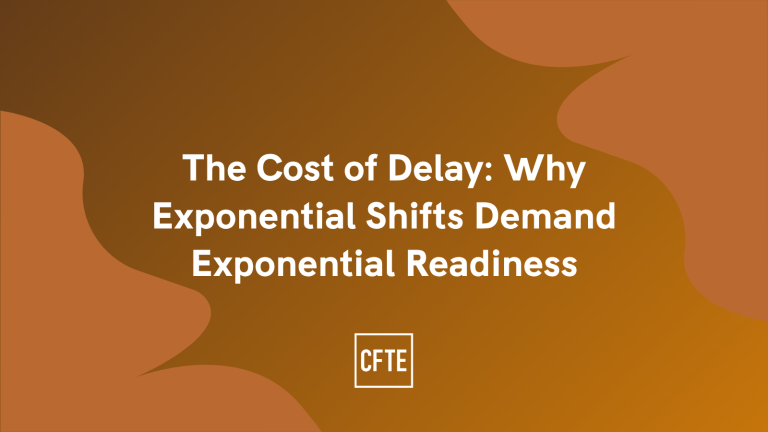In most business transformations, being late has a cost.
In exponential transformations, being late has a compounding penalty.
This is the reality facing institutions and professionals today.
AI isn’t just a new layer in the tech stack — it’s a multiplier of value, speed, and decision-making across every domain.
And those who hesitate to act aren’t standing still.
They’re falling behind — faster than they realise.
Acceleration Has Changed the Rules
When software began “eating the world,” legacy businesses had years to adjust.
Now, with AI eating the rules of value creation, the window has narrowed to months — or weeks.
The data is clear:
- AI-native teams are achieving 10x productivity gains
- Institutions structured for intelligence are outperforming traditional models — not incrementally, but exponentially
- Lagging adoption isn’t just inefficient — it’s structurally incompatible with future systems
Waiting is no longer neutral. It’s actively dangerous.
The Problem Isn’t Awareness — It’s Execution
Most organisations now acknowledge AI’s importance. They’ve formed task forces, experimented with pilots, and launched training sessions.
But acknowledgement is not the same as organisational readiness.
Many are still applying new tools to old structures — expecting transformation. This results in friction, strategic drift, and wasted effort.
What’s Needed: Exponential Readiness
To thrive in an environment of accelerating change, you need more than skills.
You need a system built for speed, adaptability, and integration.
This is what CFTE calls Exponential Readiness — the ability to:
- Rapidly deploy AI across functions
- Adapt workflows in response to capability shifts
- Embed intelligence into decision-making, not just execution
- Upskill at the level of systems, not individuals alone
This is what separates resilient institutions from fragile ones.
Why Delay Compounds
In linear systems, delay means you start later. In exponential systems, delay means you operate further from the frontier — and that gap widens over time.
The cost isn’t just slower progress. It’s being outpaced, out-learned, and out-designed by competitors who acted early.
As NVIDIA, OpenAI, and global leaders push the boundaries every quarter, those without readiness models risk falling structurally out of sync.
CFTE’s AI-fication of Talents introduces the AI Capability Engine (ACE) — a strategic framework that helps institutions:
- Move beyond pilot programmes
- Build workforce-wide AI integration
- Measure readiness and evolve it at scale
This is readiness not as a training function — but as an operating system.
Download the Whitepaper
The cost of delay is rising. The benefits of readiness compound.
This paper helps you act now — with clarity, structure, and direction.

